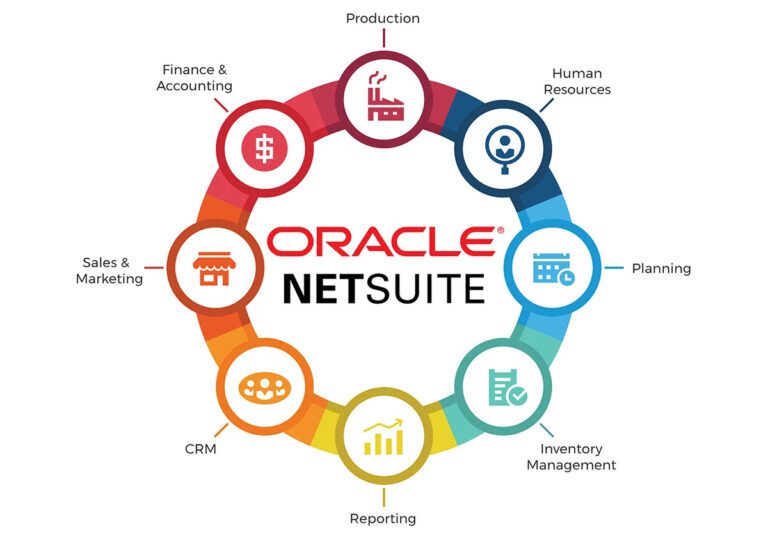Share insights into using NetSuite for financial management.
NetSuite is a comprehensive Enterprise Resource Planning (ERP) platform that offers robust features for financial management. From core accounting functionalities to advanced financial reporting and analysis, NetSuite provides tools to streamline financial processes and enhance visibility into your organization’s financial health. Here are key insights into using NetSuite for financial management:
Core Financial Management Features:
-
General Ledger:
- NetSuite’s General Ledger provides a centralized hub for recording and managing financial transactions. It supports multi-currency and multi-subsidiary operations.
-
Accounts Payable:
- Manage vendor invoices, track payments, and streamline the entire accounts payable process. NetSuite allows for automation of payment approvals and disbursements.
-
Accounts Receivable:
- Automate invoicing, track customer payments, and manage receivables efficiently. NetSuite’s accounts receivable features facilitate timely and accurate billing.
-
Cash Management:
- Monitor cash flow in real-time, reconcile bank statements, and manage bank relationships. NetSuite helps optimize cash positions and improves liquidity management.
-
Financial Reporting:
- NetSuite offers robust financial reporting tools, allowing users to create customized financial statements, income statements, balance sheets, and cash flow reports. These reports can be scheduled or generated on-demand.
-
Multi-Book Accounting:
- Support compliance with different accounting standards by managing multiple accounting books within a single NetSuite instance. This is particularly beneficial for organizations operating in multiple regions.
Advanced Financial Features:
-
Fixed Assets Management:
- Track and manage fixed assets throughout their lifecycle. NetSuite enables depreciation calculations, asset tracking, and ensures compliance with accounting regulations.
-
Expense Management:
- Streamline expense management processes, from employee expense reports to reimbursement workflows. NetSuite helps control costs and ensures accurate expense reporting.
-
Revenue Recognition:
- Automate revenue recognition processes to comply with accounting standards like ASC 606. NetSuite supports various revenue recognition methods and provides visibility into deferred revenue.
-
Financial Planning and Budgeting:
- Plan and budget for future financial periods. NetSuite’s financial planning and budgeting features facilitate collaboration, scenario modeling, and variance analysis.
-
Advanced Financial Analytics:
- Utilize advanced analytics tools to gain deeper insights into financial data. NetSuite’s SuiteAnalytics provides dashboards, key performance indicators (KPIs), and drill-down capabilities for detailed analysis.
-
Tax Management:
- Manage complex tax requirements with NetSuite’s tax management capabilities. It supports automated tax calculations, compliance reporting, and facilitates adherence to global tax regulations.
Integration and Collaboration:
-
Integration with External Systems:
- NetSuite integrates seamlessly with other business systems, including CRM, e-commerce, and supply chain solutions, ensuring a unified view of business operations.
-
Bank Reconciliation:
- Automate bank reconciliations by connecting NetSuite with your bank accounts. This ensures accurate and timely reconciliation of financial transactions.
-
Collaboration Across Departments:
- NetSuite promotes collaboration by providing a centralized platform for finance, sales, operations, and other departments. Shared data and workflows enhance cross-functional communication.
Best Practices for NetSuite Financial Management:
-
User Training:
- Ensure that finance teams are adequately trained on using NetSuite. This includes understanding workflows, reports, and utilizing automation features.
-
Regular Audits:
- Conduct regular audits of financial data and processes to maintain data accuracy and compliance.
-
Data Security:
- Implement strong security measures to protect sensitive financial data. Control access permissions based on roles and responsibilities.
-
Customization for Specific Needs:
- Leverage NetSuite’s customization capabilities to tailor financial processes based on the unique needs of your organization.
-
Stay Informed on Updates:
- Stay informed about new features and updates in NetSuite. Regularly review release notes to take advantage of enhancements and optimizations.
-
Engage Support Resources:
- Engage NetSuite support resources for assistance and guidance when needed. NetSuite’s support ecosystem includes documentation, community forums, and customer support.
NetSuite’s financial management capabilities empower organizations to maintain control over their finances, ensure compliance, and make informed strategic decisions. Whether managing day-to-day transactions or conducting advanced financial analysis, NetSuite provides a comprehensive solution for financial professionals.
Cover modules like accounts payable, accounts receivable, and general ledger.
NetSuite’s financial management functionality encompasses several modules, including Accounts Payable, Accounts Receivable, and General Ledger. These modules work together seamlessly to streamline financial processes, enhance accuracy, and provide comprehensive insights into an organization’s financial health. Let’s explore each of these modules in more detail:
1. Accounts Payable:
Key Features:
-
Invoice Management:
- Capture, track, and manage vendor invoices within NetSuite. The system supports both manual entry and automation of invoice processing.
-
Approval Workflows:
- Implement customizable approval workflows for invoices, ensuring proper authorization before payment.
-
Vendor Management:
- Maintain a centralized database of vendor information, track payment terms, and manage relationships with suppliers.
-
Automated Payments:
- Facilitate automated payment processes, including check payments, electronic funds transfers (EFT), and other payment methods.
-
Expense Reporting:
- Streamline employee expense reporting, allowing for efficient tracking, approval, and reimbursement processes.
-
Accruals and Prepayments:
- NetSuite supports the management of accruals and prepayments, ensuring accurate financial reporting.
2. Accounts Receivable:
Key Features:
-
Customer Invoicing:
- Create and manage customer invoices, whether for product sales, services, or subscription billing.
-
Payment Processing:
- Receive and apply payments from customers, supporting various payment methods, including credit cards and electronic payments.
-
Credit Management:
- Monitor customer credit limits, track outstanding balances, and automate credit control processes.
-
Dunning and Collections:
- Automate dunning processes for overdue payments and streamline collections efforts.
-
Revenue Recognition:
- NetSuite provides tools for revenue recognition, allowing organizations to comply with accounting standards such as ASC 606.
3. General Ledger:
Key Features:
-
Chart of Accounts:
- Maintain a customizable chart of accounts to categorize financial transactions based on your organizational structure.
-
Journal Entries:
- Record manual journal entries for adjustments, accruals, and other accounting transactions.
-
Multi-Currency Support:
- NetSuite supports transactions in multiple currencies, enabling organizations with global operations to manage financials seamlessly.
-
Financial Reporting:
- Generate a wide range of financial reports, including income statements, balance sheets, and cash flow statements. Customize reports to meet specific business needs.
-
Intercompany Transactions:
- Facilitate intercompany transactions and reconciliations for organizations with multiple subsidiaries or business units.
-
Audit Trail:
- Maintain an audit trail to track changes and ensure data integrity. This is crucial for compliance and internal control purposes.
Additional Considerations:
-
Integration with Other Modules:
- Accounts Payable, Accounts Receivable, and General Ledger are tightly integrated with other NetSuite modules, such as Inventory Management, Order Management, and Procurement.
-
Automation and Workflows:
- Leverage automation and workflow capabilities to streamline processes and ensure consistent, error-free financial operations.
-
Financial Controls and Compliance:
- NetSuite provides robust financial controls and features to help organizations comply with accounting standards and regulatory requirements.
-
Real-Time Reporting and Analytics:
- Access real-time financial reporting and analytics to gain insights into the financial performance of the organization. Dashboards and key performance indicators (KPIs) can be customized for specific user roles.
-
User Permissions and Security:
- Implement role-based access controls to ensure that users have appropriate permissions to view and modify financial data. This helps in maintaining data security and confidentiality.
NetSuite’s Accounts Payable, Accounts Receivable, and General Ledger modules work in concert to provide a comprehensive financial management solution. Organizations can tailor these modules to their specific needs, automate repetitive tasks, and gain real-time visibility into their financial performance. Whether managing payables, receivables, or maintaining a detailed general ledger, NetSuite offers a powerful and integrated platform for financial operations.






great post.Ne’er knew this, appreciate it for letting me know.
I’m not sure where you are getting your info, but good topic. I needs to spend some time learning much more or understanding more. Thanks for wonderful info I was looking for this info for my mission.
Keep working ,fantastic job!
I found your blog site on google and verify just a few of your early posts. Proceed to maintain up the excellent operate. I just further up your RSS feed to my MSN News Reader. In search of ahead to studying extra from you in a while!…